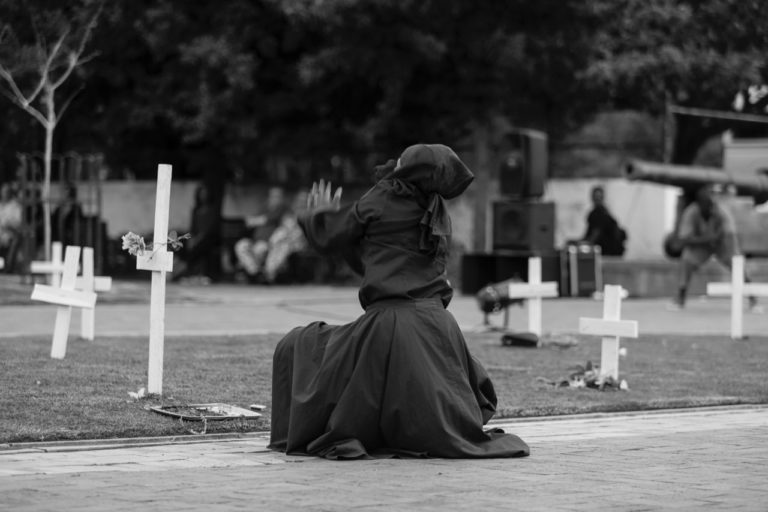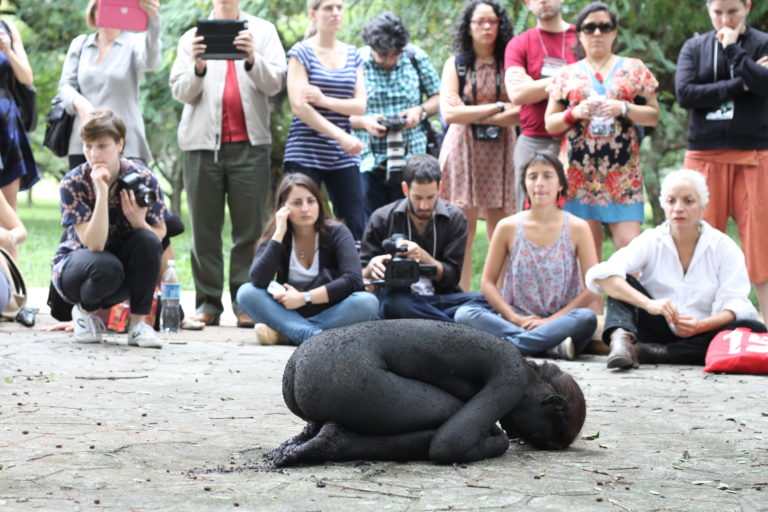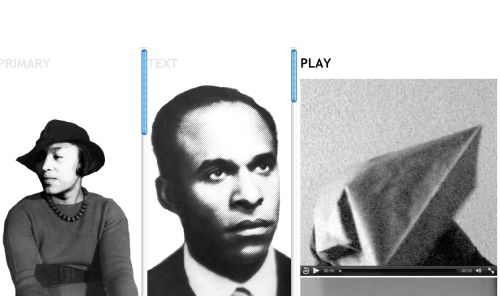The main concern of this article is situated in the theatrical experience of the 1916 rebellion walking tour as a broader mode of aestheticizing performance, focusing on the ways it traces the process of the tour to ask what the appeal is for international tourists in experiencing often tragic historical events through the use of performative strategies, namely, acts of walking and storytelling. By employing Walter Benjamin’s notion of storytelling and Michel de Certeau’s approach to the walking, this article intends to explore how the 1916 walking tour as a cultural practice rearranges and recreates the Dublin landscape, and how these new meanings are constituted aesthetically beyond their entertainment value. Furthermore, by placing this tour as performative genre, this article investigates how this historic event is embodied by the guide, perceived and transformed by tour groups, thereby creating tourists’ kinesthetic empathy during the tour, by way of the guide’s storytelling with their walking. In doing so, this article will offer a broader context of staging this historical memory that commemorates past events by way of physical engagement with this tour.
Keyword: performance
#eatthatwall
#eatthatwall is an in-progress performance-installation, presented first at Rhizome DC (a DIY experimental art space in Takoma Park, Washington, DC) on April 23, 2017. The project invited gallery participants to assist in the construction and eating of an edible wall made with approximately 1,200 mini cooked rice bricks set with refried bean mortar. The wall served as an imaginary, fabulist structure to separate a currently un-bordered area between Laredo in Texas and Nuevo Laredo in Tamaulipas, Mexico, or anywhere else this hypothetical border might arbitrarily fit. The performance score following the introduction to the project is a document of the process of making: from initial concepts, to the invitation to build/mimic, to a contemplation of how we digest the events and emotions leading to the wall, and to its eventual end.
Rage Grief Comfort &
Documentation and analysis by Laurie Beth Clark and Michael Peterson of a project by the arts collective Spatula&Barcode: In December 2016 a major city building in Madison, Wisconsin was closed for renovation, and enterprising curators installed a massive temporary art exhibition, titled Municipal. As the community was in the midst of processing the presidential election results, we created Rage Grief Comfort & with the explicit aim of moving participants through and past their immediate emotions.
Every Little Thing He Does: Entrepreneurship and Appropriation in the Magic Mike Series
This essay analyses the theatricalized performance of stripping in the popular films Magic Mike (2013; dir. Steven Soderbergh) and its sequel, Magic Mike XXL (2015; dir. Gregory Jacobs). Following a critical dance studies approach that attends to the intersection of body and gesture with socio-political, historical, and economic structures, I suggest theatricalized sexual labour in these films reveals the racial exclusions from the ideology of entrepreneurship. Considering the appropriation of black aesthetics in Magic Mike XXL’s performances of striptease, the film seeks to evaporate the spectre of race, that is, the way the white fantasy of the entrepreneurial subject is supported by the appropriation of racialized and especially black labour.
Introduction
This special issue explores how best to use performance to leverage justice for victims of trafficking, child soldiers, illegal immigrants, the poor, and others who lack recognition and protection within the legal and social apparati of national governments and some non-governmental organizations (NGOs). This focus has emerged from a two-year research project on “Gendered Citizenship: Manifestations and Performance” between scholars in theatre and performance in collaboration with politics colleagues at University of Warwick, UK and Jawaharlal Nehru University, Delhi.
Sing For Your Supper: Pauperism, Performance, and Survival
Come what may the house enables us to say: I will be an inhabitant of the world, in spite of the world.1 This essay presents a piece of performance research that brought together a theatre-maker/performer and a theatre researcher to explore the relationships between theatre and poverty. Our collaboration was just one part of a broader research project,…
“A Day for Us to Mourn”: Unsettling Performances of Marikana
Introduction On the 16th of August 2012 thirty-four Lonmin miners lost their lives at Marikana in South Africa. They were killed by the police who—after failed, ignored, or impeded negotiations with the striking miners—were assigned by the Lonmin Board of Directors and the mining unions to demobilize and dismantle the striking mass present at the…
Circuits of Invisibility: Performance, Violence, and Sexuality
The body is a repository of metaphors and within its function of global exchange, its limits of fragility and destruction, the body serves as a way of dramatizing the social text. Olivier Mongin, in his important study on film and modernity, has said that there is currently an “economía de las imágenes de violencia… [en…
Coerced Performances? Trafficking, Sex Work, and Consent
Since the millennium, there has been a growing global awareness about the business of human trafficking as it has exponentially expanded in relation to the neoliberal economic climate, the vast displacement of people through wars and conflict, and the growth of tourism and e-commerce. Because theatre and performance studies work through an epistemology of embodied…
Editors’ Introduction
This issue of Lateral examines the means by which performances happen at a variety of scales of cultural production and circulation, from the street to the living room to the border; from a cellphone to the theatrical stage to the art gallery; from public discourse in policy debates to the global circulation of performances of blackness, alterity, and power. Trends across these various means are thus particularly illuminating for the study of culture; performance can give us insight into aspects of culture more broadly and with great ability to account for differences and dynamics of power.
Paper Bag Explosions: A Theory of Becoming from Zora Neale Hurston to Frantz Fanon
Jade E. Davis embraces Lateral’s digital publishing platform in what is described as a “found media journey” informed by the theoretical works of Zora Neale Hurston’s “How I Became Colored Me” and Frantz Fanon’s Black Skin, White Masks. Davis intertwines these pieces, integrating and overlaying them with sound, static pictures, and live imagery to disrupt the act of reading and to raise questions related to “the performative role of translation” in light of the often difficult relations and circulations of blackness, gender, and language.
Queering the Archive
This CSA plenary talk discusses a performance based on oral histories collected in the author’s book, ‘Sweet Tea: Black Gay Men of the South—An Oral History’
BOT I
“BOT I” is a radical monologic mash-up of autobiographical material from Pilar’s childhood in a computing family and her passions for and against technology, cut in and through the texts of Samuel Beckett’s “Not I” and Isaac Asimov’s I Robot. This article includes the script of the performance Pilar presented at the Radical Philosophy Association Conference in Eugene, Oregon on November 13, 2010 and images from a 2011 performance. Ruthless in its refusal of all gentility and tact, and insistent in its feminist critique, Pilar’s script reveals the blind spots that capitalist techno-culture reserves for ethics and the body.










